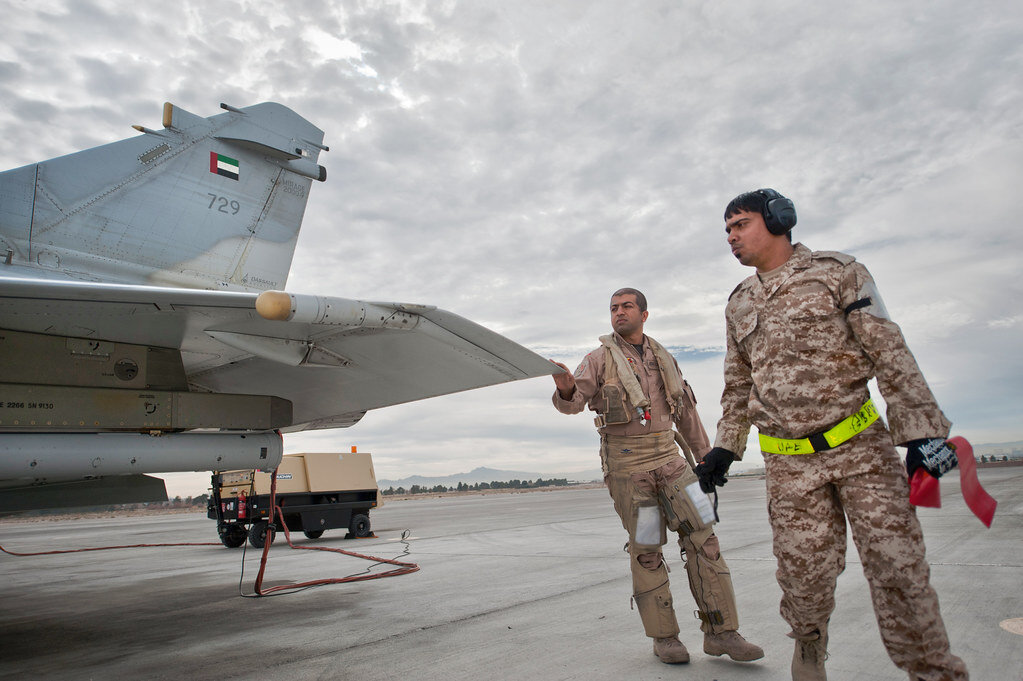Turkey And The UAE Are Locked In A Space Race — And Military Intelligence Is The Prize
United Arab Emirates Air Force Dassault Mirage 2000-9 pre-flight inspection. Photo by byaeroman3
Bellefonte — The United Arab Emirates successfully put their Falcon Eye 2 Satellite into orbit at the end of last month, according to Gulf News. The achievement comes more than a year after the device’s predecessor, Falcon Eye 1, was destroyed after a malfunction caused the rocket carrying it to divert from its planned trajectory. The second satellite’s launch was not without its own difficulties. It was delayed for months due to the pandemic, technical difficulties, and lackluster weather conditions.
Falcon Eye 2 is a military-grade reconnaissance satellite, becoming the fourth of its kind to be placed into Earth’s orbit by the UAE. Government officials stated that the device will serve multiple purposes, both civilian and military. Namely, the advanced tech’s high clarity provides a significant advantage to the UAE’s armed forces and allies, while the UAE becomes more embroiled in regional conflicts.
As the Emiratis expand their capabilities, Turkey, one of their greatest rivals, plans to follow suit. Ankara is planning to launch three broadcasting satellites over the next few years. The first of these, Turksat 5A, is scheduled to launch this month.
The updated hardware on the new Turksat devices will increase Turkey’s broadcasting and communication capabilities exponentially. The current Turksat satellites in orbit — Turksat 3A, 4A, and 4B — have been utilized in service of Turkey’s military, according to a Turksat official interviewed by Defense Here.
The scheduled launch has created a firestorm of controversy, largely due to Turkey’s involvement in the conflict between Azerbaijan and Armenia. On October 29th, hundreds protested outside of the headquarters of SpaceX in California, with many demonstrators waving Armenian flags. SpaceX is set to put the satellite into orbit for Turkey, with the scheduled mission to depart the company’s launch pad in Cape Canaveral, Florida.
The demonstrators, as well as other representatives and supporters of Armenia, worry that Turkey will use the technology to provide logistical support for its ally Azerbaijan. The six week-long Nagorno-Karabakh War resulted in thousands of deaths for both sides. Though a peace deal has been brokered by Russia, tensions remain high, and Armenians are worried that this new technology will be used against them and threaten this fragile agreement.
Considering how unusually open both the UAE and Turkey have been about using these technologies for military purposes, it is highly likely that both will be used in Libya, the source of much of the tension between the two nations.
Turkey supports the UN-recognized Government of National Accord in Libya, while the UAE backs the opposing Libyan National Army. Neither country has shied away from direct involvement in the conflict, though the UAE’s backing comes mostly in the form of economic support and unmanned drones. Turkey has not only deployed drones and warplanes, but its own soldiers to Libya along with thousands of battle-hardened mercenaries, most of whom also fought in the Syrian Civil War.
Both countries maintain that the satellites will be used for more innocuous purposes — Falcon Eye 2 will be used to monitor natural disasters and provide a useful tool for urban planners. Turkey will drastically improve the quality of digital communication for remote and indigenous communities within Turksat 5A’s coverage and potentially build a revolutionary infrastructure for the Middle East and beyond. Despite the upsides, these projects also hold the potential to exacerbate the proxy wars fought by these rising regional powers as they seek to widen their influence.

